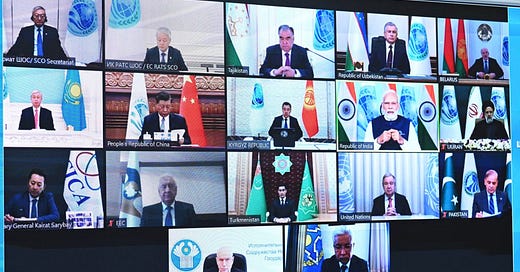DPRK needs more money; NK students win hacker contests; Iran joins SCO; UK’s new Iranian sanctions regime
Prohibited Transactions for the week of 3 July 2023 (#11)
North Korea
A North Korean official, Kim Yong-chol — previously in charge of the DPRK’s Reconnaissance General Bureau and involved in activities such as raising funds through illicit cyber activities — has returned to the Workers' Party of Korea (WPK) politburo and will likely be tasked with managing overseas operations to help raise funds. Provocations against South Korea could also increase, as Kim is known to be a hardliner when it comes to relations with Seoul. //The return of Kim, along with another former official to a position of power shows Pyongyang’s concern about the country’s current economic situation and their hope that experienced officials can make fixes.
The article about Kim also noted the DPRK’s financial situation is bad and that officials were recently told they must 1) expand the collection of “loyalty funds” from overseas workers; 2) raise funds from foreign supporters; and 3) send more IT specialists abroad to expand earnings of foreign currency via cyber activities. //North Korean trade officials in the PRC have already been ordered to be more aggressive in gathering funds and finding foreign investors. At least in the immediate future, the PRC will likely be the base for any hackers that North Korea sends out to conduct illicit cyber activities.
North Korean university students have been winning coding challenges as part of a hacking contest organized by a US-based software company, HackerEarth. Prizes include Amazon gift cards, though it is unclear if they will be transferred to the students. //Any bank that is banking San Francisco-based HackerEarth may want to ensure that their customer isn’t sending the value of Amazon gift cards to North Korean IT students.
The exchange rate between North Korean won (KPW) and the Chinese yuan (RMB) fell steadily in June, due to diminished expectations that the border between the two countries will fully reopen in the near future.
Seoul wrapped up its salvage operations of the recently launched North Korean spy satellite, declaring that it has “no military utility as a reconnaissance satellite.”
//If you’re interested in better understanding the political culture of the DPRK, I highly recommend the “Inspector O” series of detective novels by the pseudonymous author James Church, a former Western intelligence official. Church also writes an occasional column on North Korea. His newest commentary — about the recently declassified US intelligence estimate on the DPRK (discussed in issue #10) — was just published.
Iran
Iran became a full member of the Shanghai Cooperation Organization (SCO) this week, joining China, India, Kazakhstan, Kyrgyzstan, Pakistan, Russia, Tajikistan and Uzbekistan in the Eurasian political, economic and defense organization. //Tehran opens up new avenues of cooperation by joining the SCO, and is hoping that their ascension will help hasten projects such as the Chabahar port with India, and the International North-South Transport Corridor (INSTC) with India and Russia.
Iranian president Ebrahim Raisi told the SCO that for a “fair international system” to exist, it would require the “removal” of the influence of the US dollar.
Tehran is asking Moscow to rapidly implement a number of agreements recently made between the two sides in various fields including infrastructure, and the oil and gas industries.
Iran-based hackers are targeting experts in Middle Eastern affairs and nuclear security, likely to monitor people who are involved in shaping foreign policy positions related to Iran.
The US government estimates that Iran made USD19 billion in revenue from oil exports in the first five months of 2023.
According to the secretary of the Iran-Iraq Chamber of Commerce, though Iraq has paid its USD2.7 billion gas debt to Iran, the money is currently in Iraqi dinars in an account at the Trade Bank of Iraq and would require a US license to exchange the dinars for US dollars.
The UK will establish a new sanctions regime that gives the government more flexibility to sanction Iranian officials for reasons other human rights abuses, and will include the power to sanction for “the use and spread of weapons or weapons technologies from Iran.”



